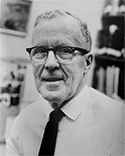D.O. Hebb was probably the most influential psychologist of the 20th century. His great achievement was to persuade a generation of psychologists that in order to understand the behaviour of living organisms it made sense to study the neural machinery responsible for that behaviour. He argued against the position of the behaviourist establishment that observations of behaviour would provide all the necessary data. In his 1949 monograph, The Organization of Behavior: A Neuropsychological Theory, Hebb proposed that neural structures that he called ‘cell assemblies’ constituted the material basis of mental concepts. Hebb’s ideas were disseminated worldwide by his students who were in great demand to establish laboratories for studying the physiological bases of behaviour. These laboratories made many pioneering contributions to the new field of physiological psychology. He studied under Karl Lashley at Chicago and Harvard, where he completed his PhD in 1936 on the effects of early deprivation upon size and brightness perception in the rat. Hebb then worked with Wilder Penfield at the Montreal Neurological Institute (1937-1939), where he explored the effects of surgical lesions of the temporal and frontal lobes on human intelligence and behaviour. After teaching at Queen's (1941-1942), Lashley invited Hebb to the Yerkes Laboratories of Primate Biology as a research fellow (1942-1947). In 1947 he returned to McGill as Professor of Psychology, serving as chairman of the department (1948-1959), Vice-Dean for biological sciences (1964-1966), and finally Chancellor of the University (1970-1974).
More information: Department of Psychology






